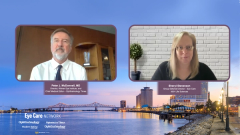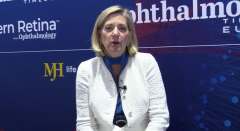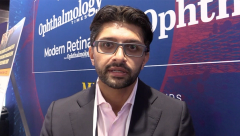
Peter J. McDonnell, MD, shares what to expect at AAO 2021
Peter J. McDonnell, MD, speaks on what attendees can look forward to at this year’s 2021 annual American Academy of Ophthalmology meeting in New Orleans.
Episodes in this series

Peter J. McDonnell, MD, chief medical editor of Ophthalmology Times® speaks with Sheryl Stevenson, group editorial director, about what attendees can look forward to at this year’s 2021 annual American Academy of Ophthalmology meeting in New Orleans.
Sheryl Stevenson: So Dr. McDonnell, thank you so much for joining us. We're looking forward to this year's American Academy of Ophthalmology meeting coming up here in New Orleans very shortly.
Peter McDonnell, MD: Thank you, Sheryl. Yeah, it's always a highlight of a ophthalmologist's year when the Academy comes around.
Stevenson: And this year it's a little different and we're slowly moving more towards normalcy in that part of the meeting is in-person. There's also a virtual option for those attendees who are not able to make the trip this year. So, there's definitely some options there for everybody to partake in some aspect of it.
Dr. McDonnell: Yeah, the economy, I think, as it does, always, the Academy has been very thoughtful and careful in its planning. And I think with the lingering pandemic, they're, very wisely, have made the virtual option available to ophthalmologists for who for—whatever reason—might not be able to or could not make the plans to get there. And particularly our international friends who, until just a few days ago, had been told they could not travel to the country. That may have changed, but maybe not in enough time for people to change their plans. So it's always ideal to be together in person. But it's wise, I believe, to have this virtual option this year, making the information accessible to so many more. And also, I hope, come next year we'll all be together person.
Stevenson: Absolutely. And how important is it that this meeting actually, that everyone is able to gather and just gain so much information during this one touch point of the year? It just seems so valuable to everybody.
Dr. McDonnell: Yeah, that's exactly right, for many, many reasons. And I hate to sound anti-intellectual, but one of the huge thrills for me at the Academy every year is seeing people that I trained with or somebody like me who's been back and forth working on both coasts, interacting with great colleagues in both places. And the Academy is the time you're able to get together again and see people and catch up and also learn from each other about what's hot and what's the newest, best, greatest stuff in ophthalmology, which as you know, Sheryl, is really one of the most innovative fields in all of medicine. And that's why we're so attractive to the top medical students [who] want to go into ophthalmology every year. So the Academy and plus to see the new products, what's just been FDA approved, what the industry people have to show us, it makes a really valuable and intense—sometimes exhausting—learning experience for a few days.
Stevenson: I mean, it truly is a community coming together, so it definitely is a must-see event. In terms of, let's just kind of dive into the program, so in terms of subspecialty day, what are some offerings that kind of leap out at you as must-see or must-view presentations?
Dr. McDonnell: Well, I'm a specialist in cornea and external disease, and a highlight for me of every Academy, since we did the first refractive surgery subspecialty day, I think back in 1988 or '89, are the subspecialty day programs. And I think for those of us, what, whatever our specialty might be—retina, glaucoma, uveitis, cornea, refractive—whatever it is, subspecialty day is [an] incredibly valuable opportunity to immerse yourself into the latest thinking and developments in your field. So whatever your specialty, I think subspecialty day is a no-can-miss, and this year it's going to be all kinds of interesting things, from artificial intelligence to sustained release drug delivery in fields like retina, glaucoma. And for the comprehensive ophthalmologist who may not have particular a subspecialty interest to catch up on, the latest in cataract surgery, refractive surgery is going to be really valuable opportunity. So I think it's a mandatory experience, to me, the subspecialty day learning experiences every year.
Stevenson: And then also just looking to the main, the actual main Academy program itself, what might be some topics or sessions that might be worth or highlights of attending this year?
Dr. McDonnell: Yeah. Well, that's why we have to do our homework, we ophthalmologists, because the Academy is this incredible smorgasbord of all kinds of things. And depending on our interests and questions that we may have, we've got to do our homework going through the Academy directory and see what's on the agenda each day. I would recommend to my colleagues they check the
Dr. McDonnell:And obviously for a cornea person like myself, anterior segment, things like the new treatments that have come down the road in terms of FDA approvals for dry eye, and in addition to FDA approvals, a lot of interesting things in the pipeline. For many of us ophthalmologists, the new approvals related to perhaps treatments for presbyopia, including topical therapies. Those of us that are annoyed about doing monthly injections of anti-VEGF agents, the potential to take advantage of the sustained release approaches will be very important. So, as I said, because there's so much being presented and nobody can absorb it all, it really, I think, pays to do our homework before we leave our cities and head to New Orleans and plot out, day by day, what would be the most valuable sessions, most interesting session for each of us. And for each of us, it'll be different.
Stevenson: Absolutely. I mean, it's like a menu. There's just so many different offerings and it's almost impossible to see it all in the limited time that we have, but we definitely need to make the most of it while we're there.
Newsletter
Don’t miss out—get Ophthalmology Times updates on the latest clinical advancements and expert interviews, straight to your inbox.




























